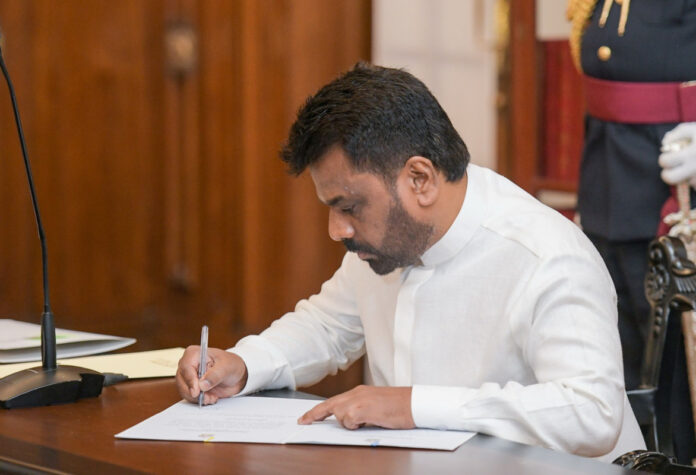June 10, Colombo (LNW): President Anura Kumara Dissanayake, in his message marking Poson Poya Day, called upon the people of Sri Lanka to draw inspiration from the values of the Dhamma and to work collectively towards building a principled and harmonious society.
Reflecting on the historical significance of Poson, the President emphasised that it was on this sacred day that Arahant Mahinda Thero arrived in Sri Lanka, ushering in not only the Theravada Buddhist tradition but also a profound cultural and civilisational transformation.
He described this moment as the spiritual awakening of the nation, setting the foundations for a society rooted in wisdom, compassion, and moral clarity.
The President highlighted the meeting between Arahant Mahinda and King Devanampiyatissa as a pivotal moment in the country’s history. The King’s symbolic act of laying down his bow in deference to the message of nonviolence exemplified the enduring principle of Ahimsa, which, according to the President, remains urgently relevant in today’s conflict-ridden world.
He noted that Poson Poya is not only a time for religious observance but also a reminder of the timeless values needed to guide the nation. In an age where violence, moral decline and environmental degradation are prevalent, the teachings of the Dhamma offer a path towards renewal. The President urged citizens to reflect on the importance of discernment — recognising what is meaningful and what is not — as taught by the Buddha.
Calling for a revival of a disciplined and ethically conscious society, the President stressed that true social, political and economic reform must be underpinned by virtue and wisdom. He invited all Sri Lankans to unite in a common purpose of building a modern nation that respects cultural heritage while embracing ethical progress.
President’s Full Message:
The Poson Poya holds significant importance for us in Sri Lanka as it marks a series of religiously significant events in the history of our country. The inception of our nation as a heartland for Theravada Buddhist philosophy and tradition was signified on that remarkable Poson Poya Day, when Arahant Mahinda Thero arrived in Sri Lanka.
The arrival of Arahat Mahinda in Sri Lanka sparked a spiritual awakening as well as a deep social transformation, reaching far beyond its religious significance. It initiated progress in our cultural, social and political spheres, establishing the foundation for a more enlightened and structured civilization. The way of life rooted in the Dhamma contributed to the emergence of a morally enriched and spiritually conscious society.
King Devanampiyatissa’s significant gesture of laying down his royal bow and adopting a stance of nonviolence upon meeting Arahant Mahinda Thero illustrates the deep-rooted principle of Ahimsa, or non-violence. One of the significant qualities that ought to be emphasised among the values celebrated on Poson Poya Day is non-violence. In a world where violence continues to afflict humanity on many fronts, Poson Poya Day reminds us that ‘Ahimsa’ is a timeless value that safeguards both one’s own and others’ right to life and freedom. It is a noble practice and a necessary path in today’s world, perhaps now more than ever.
The noble Dhamma gifted to this land by Arahant Mahinda Thero teaches us the importance of seeing “what is meaningful as meaningful, and what is meaningless as meaningless.” What we need today are disciplined and responsible individuals who embody this wisdom. The noble duty entrusted to us is to re-establish such a principled society in our land, enabling us to build a modern, morally grounded nation, one that embraces social harmony, ethical values and environmental responsibility.
I firmly believe that the social, economic and political transformation we aspire to can only be realised through the revival of such a cultured and virtuous society. On this Poson Poya day, I invite everyone to come together in unity and collective purpose toward that vision.
May this blessed Poson Poya Day illuminate the hearts of all Sri Lankans with the light of Dhamma.

